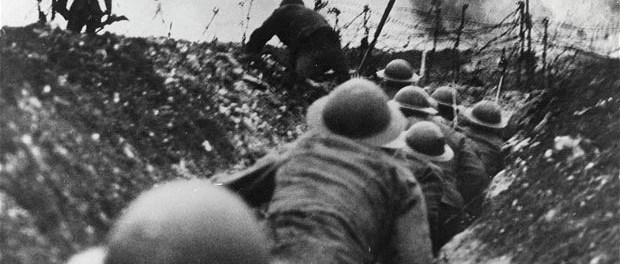A few days ago, a student asked me if I believed World War Three would happen in our lifetime. It’s a question many people have asked over the years, and of course we pray that we will never have to say yes to such a question.
This week marks 100 years since the beginning of World War One. The war to end all wars, as it was dubbed. It was a conflict where the root causes lay in territorial disputes, ethnic tensions, imperialism, and on settling old scores between nation states.
Interestingly, the first world conflict of the twentieth century started with an act of terrorism, when Gavrilo Princip, acting for the Serbian Nationalist group ‘The Black Hand’, assassinated Austrian Arch-duke Franz Ferdinand in the streets of Sarajevo, Bosnia. The shot pulled the trigger on a conflict that embroiled Europe and its various colonies in a war that would last for four years, and the subsequent peace treaties would sow the seeds for the haunting next chapter that was World War Two.
These were the days of the nation-state, when diplomacy was a secondary consideration to conquest, power and nationalist pride. Fortunately, but certainly not in all pockets of the world, the threat of all out war between superpowers has receded, thanks in part to the recognition that war is futile, but also in recognition that any such conflict would ensure mutually assured destruction among the combatants and their civilian populations. International trade and cooperation, transnational corporations and multilateral organisations have created an environment where war between the great powers of the world is most unlikely – and I certainly hope I am right in my assessment.
While North Korea might be a rogue state, and where the USA and China might not always trust the other, it is doubtful that this century will see a war anywhere near the scale of the two during the last century.
Yet what threatens our peace is no longer the nation-state, but something more scary. The biggest threat to our peace is those living in the shadows, the underground networks where radical ideas fester and spread. The pockets of clandestine organisations throughout the world who plot the implementation of their own worldview. The internet has created the means by which splinter groups can become vast, complex and sophisticated organisations that aren’t localised but far reaching throughout the globe.
The obvious example that comes to mind is radical Islam and the extremist groups that plot the overthrow of western civilisation, yet the threat is not confined to one religion or worldview. Organisations with any sinister intent now have the power to spread their message with ease – and this is what’s most scary: you can defeat an army and conquer land, but you can’t kill an idea. And this is where the threat is most potent – the power of radical ideas and their ability to bypass the power of the state and transcend national borders.
The future conflicts will be marked not by armies and delegates, but by disenfranchised groups that are unpredictable and not confined to a single location. The unfortunate by-product of globalisation is that as state borders become less significant, so too does our power to predict or control the spread of ideas that are malicious in nature.
The threat to future peace is not a Stalin signing off on the development of long range missiles or a vast nuclear weapons program, but in the quiet homes in innocuous streets where networks of people arrange, coordinate and plan for attacks that will generate world indignation and inevitably attract fellow disenfranchised folk to their cause. The most significant attack on Western Civilisation this century was not the product of any nation seeking to expand its interests, but from a quiet group of religious dissidents that plotted the attack on an unsuspecting United States.
The battlelines have been redrawn. Terrorism and radical ideas have always been around, sure, but now they are more potent, more worldly, and with greater access to weaponry. But most scarily, they have greater access to the hearts and minds of citizens across the globe – and this is our new reality.
The threats to world peace are not what is in front of us, but what is hidden beneath the surface, in the shadows.
So what was my answer to the World War Three question?
To put it simply, no-one knows what to expect – because that’s the new world we live in. Where what we don’t know is what is most dangerous.





